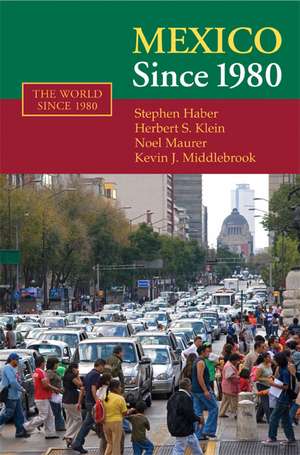Mexico since 1980: The World Since 1980
Autor Stephen Haber, Herbert S. Klein, Noel Maurer, Kevin J. Middlebrooken Limba Engleză Paperback – 20 iul 2008
| Toate formatele și edițiile | Preț | Express |
|---|---|---|
| Paperback (1) | 222.33 lei 43-57 zile | |
| Cambridge University Press – 20 iul 2008 | 222.33 lei 43-57 zile | |
| Hardback (1) | 463.54 lei 43-57 zile | |
| Cambridge University Press – 3 aug 2008 | 463.54 lei 43-57 zile |
Preț: 222.33 lei
Nou
Puncte Express: 333
Preț estimativ în valută:
42.54€ • 44.54$ • 35.20£
42.54€ • 44.54$ • 35.20£
Carte tipărită la comandă
Livrare economică 07-21 aprilie
Preluare comenzi: 021 569.72.76
Specificații
ISBN-13: 9780521608879
ISBN-10: 0521608872
Pagini: 266
Ilustrații: 41 b/w illus.
Dimensiuni: 150 x 226 x 18 mm
Greutate: 0.36 kg
Ediția:1
Editura: Cambridge University Press
Colecția Cambridge University Press
Seria The World Since 1980
Locul publicării:New York, United States
ISBN-10: 0521608872
Pagini: 266
Ilustrații: 41 b/w illus.
Dimensiuni: 150 x 226 x 18 mm
Greutate: 0.36 kg
Ediția:1
Editura: Cambridge University Press
Colecția Cambridge University Press
Seria The World Since 1980
Locul publicării:New York, United States
Cuprins
1. The second Mexican revolution: economic, political, and social change since 1980; 2. Mexico before 1982: the political economy of authoritarian rule; 3. The causes and consequences of free trade; 4. The Mexican banking system: the politics and economics of financial underdevelopment; 5. The transformation of Mexican politics; 6. Health, education, and welfare in Mexico since 1980; 7. Democracy and development in Mexico: future challenges and the legacy of authoritarian rule.
Recenzii
“The four authors have brought together their different disciplinary strengths and their considerable scholarly gifts to produce an interesting new take on what has by now become a familiar story about Mexico's dramatic shift from protectionism to free markets, and from authoritarianism to democracy...The argument is persuasive, well documented, and a mostly readable account of Mexico's transformation...an excellent contribution to our understanding of this period in Mexican history, and, more generally, to the political economy literature.” -
Kathleen Bruhn, University of California Santa Barbara, Comparative Politics Book Reviews
“This is a volume that is as brilliant as it is controversial. Its brilliance lies in the depth and quality of research, the clearness of argument, and a focused theoretical underpinning. It is an impressive example of the ability of the new institutional economics to explain recent history….It is the best analysis of modern Mexican political economy that I have seen.”
Jeffrey Bortz, Appalachian State University, Journal of Economic History
"Scholars from diverse backgrounds will find Mexico since 1980 useful for its conceptual insights into how authoritarian regimes work; as an accessible account of a major economic, social, and political reform process; and as an outstanding synthesis of a puzzling period of Mexican history."
Hispanic American Historical Review, Graciela Marquez, El Colegio de Mexico
Kathleen Bruhn, University of California Santa Barbara, Comparative Politics Book Reviews
“This is a volume that is as brilliant as it is controversial. Its brilliance lies in the depth and quality of research, the clearness of argument, and a focused theoretical underpinning. It is an impressive example of the ability of the new institutional economics to explain recent history….It is the best analysis of modern Mexican political economy that I have seen.”
Jeffrey Bortz, Appalachian State University, Journal of Economic History
"Scholars from diverse backgrounds will find Mexico since 1980 useful for its conceptual insights into how authoritarian regimes work; as an accessible account of a major economic, social, and political reform process; and as an outstanding synthesis of a puzzling period of Mexican history."
Hispanic American Historical Review, Graciela Marquez, El Colegio de Mexico
Notă biografică
Descriere
This book addresses two questions that are crucial to understanding Mexico's current economic and political challenges.























